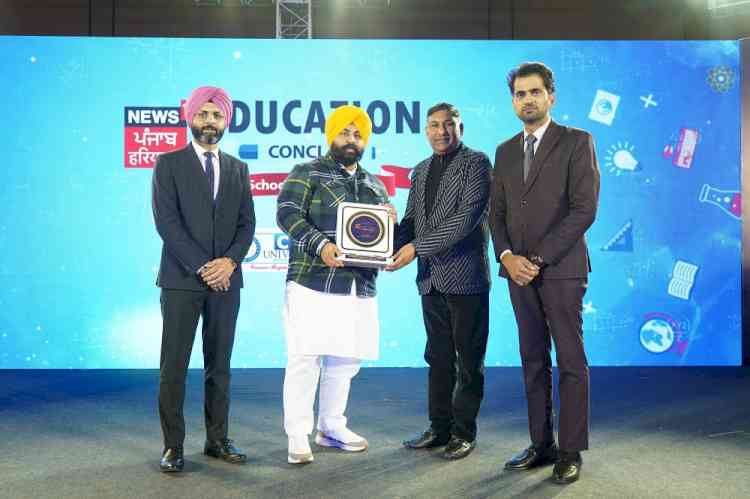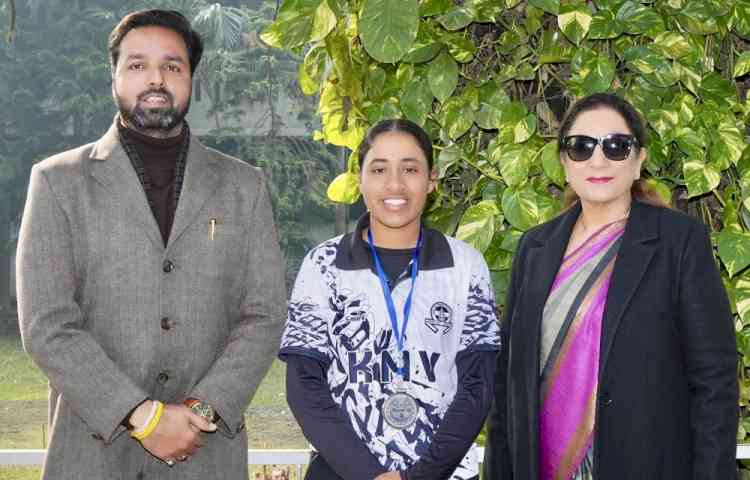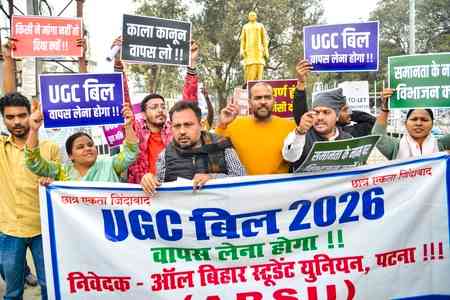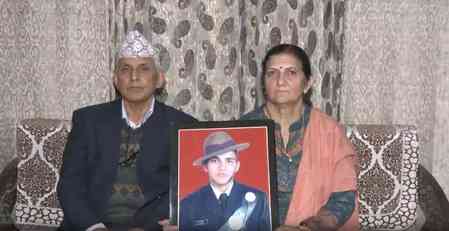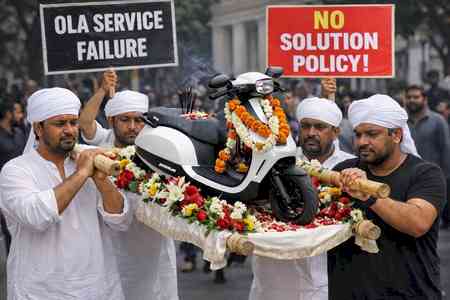Panel discussion on prison reforms in India: socio-legal perspective
There were more than 200 participants in this event
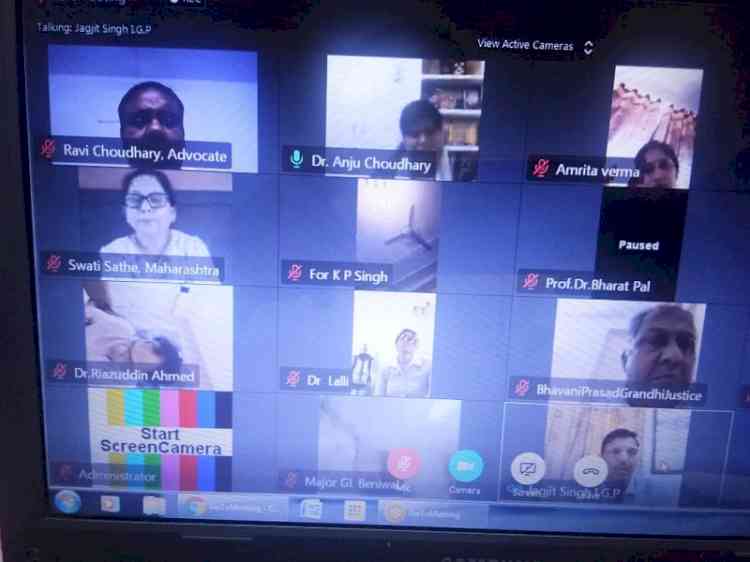
Chandigarh: A Webinar On “Prison Reforms In India: Socio-Legal Perspective” was organised by Dr. Anju Choudhary, Faculty and Teacher In-charge of the Criminal Justice Practicum Cell (CJPC) of University Institute of Legal Studies (UILS),Panjab University, Chandigarh.
Prof. (Dr.) Raj Kumar ,Vice Chancellor was the Chief Patron of this event and Ms. Anu Chatrath Dean, Faculty of Law along with Prof. (Dr.)Rattan Singh ,Director, UILS acted as the Patron of this event.
The Chief Panellists for the discussion were Ms. Viplove Thakur, Member of Parliament, Rajya Sabha; Former Justice G. Bhavani Prasad, Andhra Pradesh High Court; Sh. Somesh Goyal IPS, Director General, Prisons, Himachal Pradesh; Dr. K.P. Singh IPS, Director General, State Vigilance Bureau, Haryana; Sh. M.V. Krishna Rao, IPS (Retd.) Former DGP, Andhra Pradesh; Sh. Jagjit Singh, Inspector General of Prisons, Haryana; Dr. M.R. Ahmed, Former Inspector General of Prisons, Andhra Pradesh and currently Director, Academy of Prisons and Correctional Administration, Telengana; Ms. Swati Sathe, Deputy Inspector General of Prisons, Maharashtra; Dr. Upneet Lalli, Deputy Director,Institute of Correctional Administration( ICA), Chandigarh and Sh. Ravi Choudhary, Advocate, Supreme Court of India.
Dr. Anju Choudhary moderated the event and questioned the panellists on the various facets involving Correctional Administration, Prison Reforms, The Prisons Act 1894, Condition of Women and LGBTQ’s in Prison, Condition of Prisons and Prisoners during Covid-19 Outbreak and Use and Need of Technology to improve coordination between Police, Courts and Correctional Institutions.
Prof. (Dr.) Rattan Singh gave the inaugural speech where he introduced the topic and discussed the view of the Hon’ble Supreme Court of India during the present scenario. He was followed by Former Justice G. Bhavani who shared his experiences as a Judge and highlighted the need of psychological evaluation and treatment of prisoners and the plight of under trial prisoners in the wake of Covid-19 pandemic.
Sh. Somesh Goyal IPS, DG Prisons, H.P. raised the issue of overcrowding in prisons. He brought the attention towards the need for a centralised scheme to make prison atmosphere amicable so as to foster the objective of reformation and rehabilitation of prisoners. He acknowledged and appreciated efforts of Andhra Pradesh and Jharkhand Prisons in this regard. He further raised questions on the government’s intentions for Prison Reforms and stressed on a better and transparent mechanism to effect reformation in letter and spirit.
Dr. K.P. Singh discussed the reforms required in prisons through the spectrum of Human Rights. He reminded the International Obligations and the guidelines issued by the United Nations Human Rights Commission to treat prisoners as humans and thus, enforcing their basic Fundamental and Human Rights.
Sh. M.V Krishna Rao, IPS (Retd.) Former DG Prisons A.P. delivered his valuable insights on the role of sates in promoting prison reforms, He emphasized that the person appointed as the Head of the Department should have the capability and Political Confidence of the government in order to effect and implement changes. He appreciated the Governments Policy regarding Prisons being kept under the State List (Schedule VII of the Constitution of India) and warned against unnecessary centralization of power.
Sh. M.R. Ahmed, Former IG Prisons A.P. and Director, Academy of Prisons and Correctional Administration, Telengana mentioned in detail regarding the various national and international covenants involved in the Prison Reforms System. It is pertinent to mention here that Sh. M.R. Ahmed had been instrumental in suggesting numerous reforms as contained in the Model Prisons Manual 2018. He has been a member of Bureau of Police Research & Development(BPR&D) and various high powered committees dealing with Prisons and Prisoners. He deeply emphasized on the need of a Central Service dedicated to Prisons in order to effect changes in the field of Correctional Administration and to increase the participation and answerability of the Correction Officers in the domain of Prison Reforms.
Sh.Jagjit Singh, I.G. Prisons, Haryana emphasized on the need of medical facilities and doctors to curb drug menace inside prisons. He pointed out towards the need of better funding and infrastructure in order to implement the directives of the Prisons Act. He informed regarding setting up of High Security Prisons in Haryana in order to house criminals of heinous crimes.
Ms. Swati Sathe, DIG Prisons, Maharashtra emphasized on the need of better training and equipment to the Correctional Officers. She emphasized on the plight of female prisoners who are abandoned by their families and society at large. She categorically mentioned the comparison standards of male with female Prison Officers and the non-cooperation non-acceptance of female Prison Officers by male Prison Officers. She emphasized on the need of better coordination between male and female prison officers and stressed upon positive time occupancy of criminals to effect reforms in prisons.
Dr. Upneet Lalli, Dy. Director, ICA Chandigarh, emphasized on understanding the psychological challenges faced by a criminal inside and outside of the prison. She asked for better society support of effect reformation in prisoners. She was deeply concerned with the way the women and her children are treated by the Prison Authorities.
The session was concluded by Sh. Ravi Choudhary, Advocate Supreme Court of India. He expressed his views regarding the working conditions of Prison Officers and decribed their job as very challenging, stressful and tedious. He advocated the need and importance of psychological evaluation of Prison Officers as without them no reforms could take place inside the Prison. He further reflected upon the pendency of cases as one of the major impediments in reforming the condition of prisons and prisoners. He further asserted on the need of a centralized code which could suggest and effect changes and reforms in the Correction System without unnecessary delay. He asserted better coordination between the various functionaries of the Governemnt in order to help implement the reforms suggested in the Modern Prison Manual’ 2018. He further expressed his views regarding the threats on life and liberty of Prison Oficers and their families and advocated the introduction of Hazard Pay for the Prison Officers.
In the end Dr. Rajinder Kaur, Assosiate Professor, UILS thanked all the panellists and participants for their valuable inputs. She praised the efforts of Dr. Anju Choudhary for organising an eye opener event on Prisons.
Dr. Anju thanked everyone with special reference to Sh. Subhash Chandra, Technical Staff, UILS, Arpit Malhotra, a student of 5th Year in UILS and her CJPC Team, for providing their support for the Webinar
More than 200, participated in this event.


 cityairnews
cityairnews 
